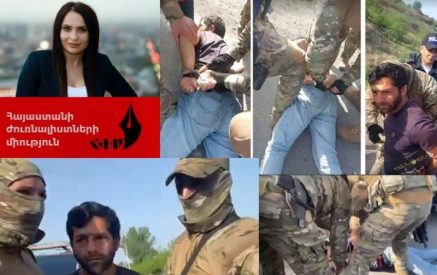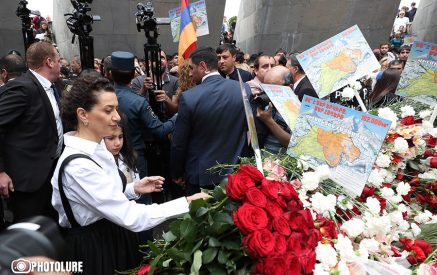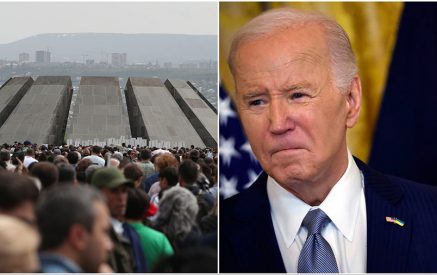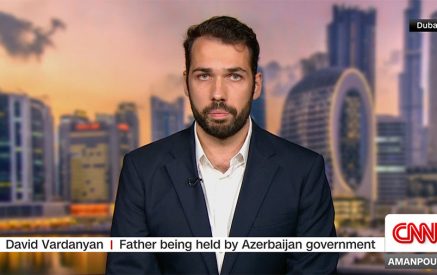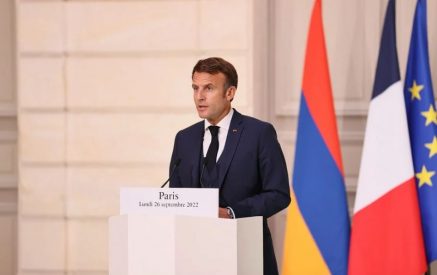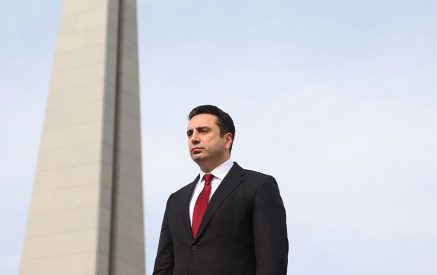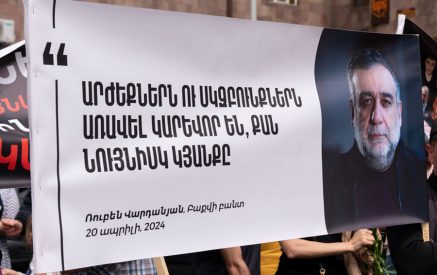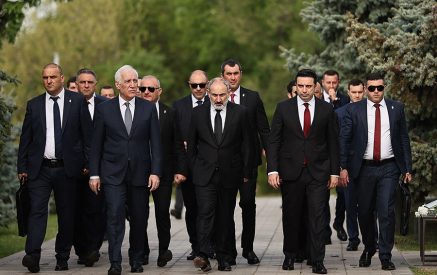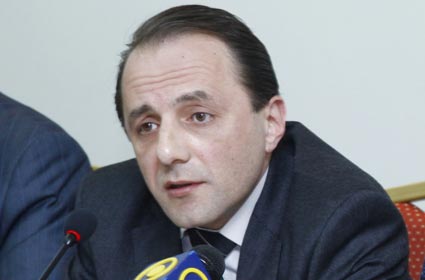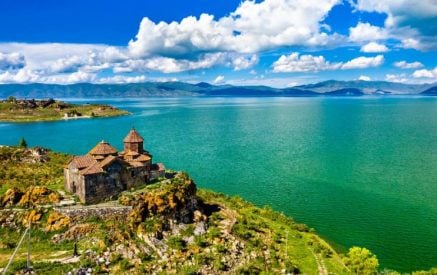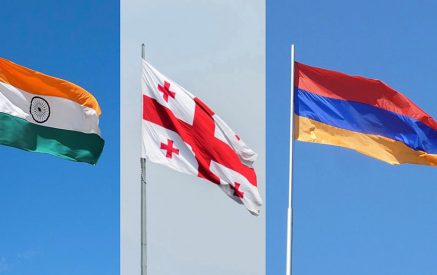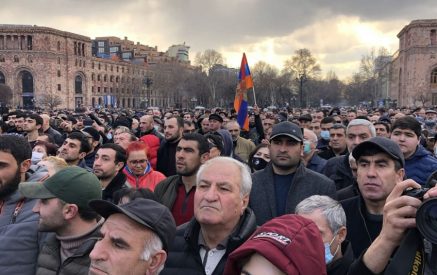Ruben Mehrabyan
Political Analyst
“Improving Security Policy Debates in Armenia” Program (NED)
The Armenian Institute of International and Security Affairs (AIISA)
Read also
Despite the current minor level of Armenia-Ukraine interstate relations irrelevant to its potential, Ukraine is a highly significant country for Armenia, as well as a key Eastern Partnership country due to its size and importance in European and Euro-Atlantic security system.
To understand Ukraine’s role and place, the definition of Zbignev Bjezinski[1] remains very elucidative: “Without Ukraine, Russia ceases to be an empire, but with Ukraine suborned and then subordinated, Russia automatically becomes an empire.” Continuing his logic, one may say, that thereby a direct way to eliminate the Armenian statehood, reborn with the collapse of the Soviet Union, or to engage it at least in the zone of influence of a new Russian or “Eurasian” empire automatically opens.
The new Ukrainian government, formed after the victory of Maidan and president Yanukovich’s escape, has initiated radical reforms which affect all spheres – economy, defense and security systems. Decommunizations, reevaluation of the past and values, as well as nation-building processes accompanied with the resistance and sabotage by certain interest groups and factual information terror on Russian TVs, are taking place in the context of lasting shock and unpreparedness of the West to such a challenge.
Outcome of processes in Ukraine will predestine not only future of Ukrainian statehood, but all post-Soviet countries as well, including Armenia. Therefore, what kind of Russia—imperial or not—Armenia will have to deal with in the future, mainly depends on that.
Ukraine is the second country after France in Europe by the number of Armenian community, which is closely integrated into Ukrainian society, is rather organized and functions in accordance with the agenda of Ukrainian state. As per 2001 population census, its number was about 100 thousand people; in 2010 Alexander Bozhko, the Ambassador of Ukraine to Armenia, gave the number 300 thousand, adding that in the foregoing 20 years the number of Armenians has increased 10 times. Based on non-documented data of the Union of Armenians of Ukraine, their number reaches 400-500 thousand people.
Armenians of Ukraine take the most active part in defense of the country from Russian aggression. According to Nikolay Knyazhickiy[2], Deputy of Verkhovna Rada of Ukraine, 52 volunteer-Armenians, fighting in Ukrainian Armed Forces, National Guard and volunteer corps, were killed as a result of military operations against pro-Russian militants and Russian military in the country’s east. This number was confirmed by Arsen Avakov[3], the Minister of Internal Affairs of Ukraine.
At the same time, level of political and economic relations is still low, and societal potential of two countries is less fulfilled in building bilateral ties. Understanding of above mentioned realities among Armenia’s political establishment remains extremely low. Prevailing viewpoint is that what is happening in Ukraine is due to “error” and “lack of common sense” by political elite, etc., but not as a process originated because of purely objective reasons: first and foremost, by virtue of the fact, that post-Soviet system ceased to react to real demands of societies and exhausted itself by all parameters, and secondly, according to the definition of Lilia Shevtsova, Russian political scientist, the so-called “Russian” system, opposing to the western one, shifted to the stage of agony[4].
While these kinds of moods and opinions on Ukrainian affairs, expressed by Armenian authorities, ruling party and oligarchic structures are usually expected, similar positioning by leading opposition or quasi-opposition politicians, has a disorienting impact on the society, particularly, against the background of almost unlimited Russian, i.e. anti-Ukrainian propaganda in Armenia.
Ipso facto, inertial thinking is at the core of Armenian public perception on developments in Ukraine, as something far away, not having direct relation to Armenia. It is largely formed under the influence of Russian TVs, or their own plots, broadcast in Armenian by Armenian TV channels. Following the position of official Yerevan, Ukraine is a friendly country. Edward Nalbandyan[5], Armenian Minister of Foreign Affairs, in his speech during the NATO Parliamentary Assembly Rose-Roth seminar of 18-20 June in Yerevan, stated that not only centuries-old friendship but also the Armenian community of many thousands connects Armenia and Ukraine, and Yerevan welcomes the Minsk agreements on Ukraine. At the same time, he expressed a hope, that these agreements would shape a way for comprehensive resolution to the crisis.
However, the reality is that Armenia made blunders, which not only go against the spirit of countries’ friendship, but also discredit Yerevan before the world community and challenge its positions on account of unresolved Nagorno-Karabakh conflict: Yerevan supported Russia’s policy in Ukraine which goes against the international law and undermines the existing system of international relations.
Both authorities and titular opposition in their rhetoric came to exploit the topic of Maidan for a kind of legitimacy of their own policy. Pro-governmental politicians stressed the “prudence” of the Armenian opposition, while the latter echoed about the impossibility of Maidan in Armenia, arguing that: anti-Russian moods in Armenia are ruled out; the Armenian society is disappointed with the West; and the West itself provoked Russia for abrupt actions, while initially Kremlin didn’t put tough conditions before Armenia and Ukraine to engage them in the Moscow-backed Customs Union. “However, when it noticed, that explicit effort is made to remove these countries from its zone of influence, it appeared with hasty position,”- Levon Ter-Petrosyan, Armenia’s first president, stated in his article[6].
Meanwhile clash between the two—European and so-called “Eurasian” integration projects—seems inevitable by virtue of internal evolution of Europe’s Eastern and Russia’s domestic policies, having their projections on foreign policies, too.
Totally corrupt and criminal-oligarchic regimes both in Russia and post-Soviet countries are shaped in the territory of former Soviet empire, which gradually came to position themselves as alternatives to the West and its system of values. With the start of the third term of V.Putin, back to the presidential post after D.Medvedev’s 4-years nominal ruling, the largest complex of authoritarian regimes in the world has been crystallized. The backbone of those regimes are “Petrocracies” at the head of Russia, which are “attached” to countries’ poor resources, but with the same systemic flows: vertically integrated corruption; lack of the rule of law; businesses merged with politics and civic service; monopolized politics and economy; suppression of citizens’ rights and freedoms; organized election frauds and etc. By virtue of these, all those regimes are gravitating to Russia in their search of guarantees for self-reproduction.
The EU Eastern Partnership program, as an idea, has been initiated as a response to Russian intervention into Georgia in 2008, with the purpose to mitigate differences in European area and to meet natural aspirations of the EU’s six post-Soviet neighbors in terms of their further rapprochement with the united European family, avoiding from confrontation with Moscow. Shifted from an idea into practice, agreements on Association and Deep and comprehensive free trade area with the EU have been offered to 4 EaP countries in 2010.
Initially, Russia regarded[7] that program with no special interest and “alarming moods,” though indicated, that this “can threaten” its interests without specifying-what? In mid 2013, when about four-year negotiations were close to their successful finalizing, Moscow perceived the process “with the bayonet.” Through imposed systematic and tough pressure on authorities of post-Soviet countries, Russia started challenging not only their security interests, but also the whole system of international relations, formed after the collapse of the USSR: with annexation of the Crimea Moscow endangered post-WWII order, as Russian policy largely reminded[8] Germany’s 1938 policy of annexation of Czechoslovakia’s Sudetenland region, and “Anschluss” of independent Austria.
The global crisis of 2008, fallen upon high-record prices for oil, made further efficiency of post-Soviet systems practically impossible without changing their nature through radical reforms. Or, Russian regime had only to fence itself off from the West, dragging away dependent regimes with the hope not to allow any changes and exploiting them as a geopolitical buffer, and, by that, prolonging its effectiveness. Moscow has chosen this very way, which we observed in Ukraine in its “hard version”, and in Armenia – a “soft” one, without military components. Up till now Armenian political establishment does not only call a spade a spade, but also formed a sort of taboo from it.
Under the unfolded “ice age” between Armenia and Ukraine at the moment, bilateral relationship needs in reformatting, as well as new channels and platforms for communication. On the website of the Embassy of Ukraine to Armenia it’s stated[9], that no political contacts have been recorded between Ukraine and Armenia in the period of 2014. “That was connected to Armenia’s voting of 27 March 2014 on the UN General Assembly’s resolution “On territorial integrity of Ukraine.” Bilateral relations before Maidan were mostly based on business-interests of individuals, groups of interests and oligarchic structures rather than on political ones. At the moment, this inertia seemingly continues: in particular, parliamentary diplomacy[10] i.e. Armenia-Ukraine friendship group at the Armenian Parliament is inactive indeed, and there is not a single mentioning on parliamentary relations with Armenia on the website of Verkhovna Rada, too.
Within the frame of the EU Eastern Partnership program the 40-million Ukraine is of key importance amongst post-Soviet six countries. However, by virtue of objective and subjective reasons that factor and existing potential are not actuated yet, which is also reflected on current relationship between Armenia and Ukraine. Besides, positive dynamic in relations between Georgia and Ukraine sharing the same future and interests, as well as visible normalization of relations between Iran and the West, open new perspectives, in which common interests and field of activity for Armenia-Ukraine relationship are also being outlined.
Bilateral relations on social level – among mass media, non-governmental organizations and expert communities—are still weak, while numerous issues of mutual interest are present, which require constant “synchronization of watches.” It seems that Georgian and western partners—both in the EU and the USA—might be interested in deepening of ties on that level.
Presently official Yerevan is rather capable to combine a balanced position towards Ukraine that would rule out damaging Armenia’s perceptions in that country and encourage supporting Kiev on unofficial level. Moreover, significant reinforcement of works by the Embassy of Armenia to Ukraine is necessary to enhance connections with Ukrainian society and mass media. Meanwhile, using clichés of Russian propaganda—“civil war”, “self-determination of the Crimea” and etc., having nothing in common with the reality—to express its own attitude the official Yerevan only intensifies Armenia’s isolation and weakens its positions in regional politics.
Rhetoric or even indirect parallels of Karabakh with the Crimea[11] are not only incorrect, but far from reality as well, and don’t stand any criticism. Moreover, they devaluate Armenia’s and NKR’s positions in negotiation process, complicate their relations with the USA and the EU and, by that, intensify their one-sided political dependency on Russia. According to David Shahnazaryan, an Armenian politician, references to the right of self-determination are “provocative towards Armenia and Karabakh”, and its interpretation by Russian authorities are profanation, and discredit not only the principle in itself, but also is an attempt to cast shadow upon independency proclaimed by former Soviet republics after the collapse of the USSR, which is characterized by Putin as a “greatest geopolitical catastrophe.”
Hard and consistent work is needed to break the ice in bilateral relationship for the time being, and not allow projection of coolness on mutual perceptions on social level. All necessary premises exist for that. Particularly, statement[12] by the president of Ukraine at the press-conference on results of the EU Eastern Partnership’s Riga Summit, that in talks with president Serzh Sargsyan he “had been assured, that Armenia demonstrates solidarity with Ukraine”, is a clear-cut evidence of that.
[1] The Battle for Ukraine. Vladimir Putin wants to recreate a Russian sphere of influence. The Wall Street Journal. 27.11.2013
[2] Verkhovna Rada of Ukraine honored victims of Armenian Genocide in Ottoman Empire by silence minute. First Armenian News and Analyses, ru.1in.am. 24.04.2015
[3] Arsen Avakov. Personal page on Facebook. Comment of 24.04.2015.
[4] Has the Russian System’s Agony Begun? Lilia Shevtsova. The American Interest. 17.05.2015
[5] Armenia is a safe partner for NATO. Edward Nalbandyan’s speech (in Armenian). First Armenian news and analyses. 1in.am. 18.06.2015
[6] Maidan didn’t occur in Armenia out of deep disappointment of nation in the West. Article by L.Ter-Petrosyan on Ilur.am, in Russian – on Иносми.ру. 11.01.2014
[7] Collaboration program of the EU and CIS countries can damage Russia’s interests – Lavrov. News-Armenia. 13.05.2010.
[8] Andrey Piontkovskiy: “Putin’s conception of the “Russian world“ threatens all the territories, where there is Russian population”. Interview to the website of the Institute of Modern Russia. 26.02.2015
[9] Section “Political partnership between Ukraine and Armenia”. Official website of the Embassy of Ukraine to Armenia.
[10] Friendship Group Armenia-Ukraine. RA NA official website.
[11] David Shahnazaryan: “Comparison of the Crimea with Karabakh – provocation towards Armenia and Karabakh”. Aravot. 11.03.2014
[12] The position of Belarus and Armenia on the issue of the Crimea doesn’t bother me – Poroshenko. “European truth”. 22.05.2015.


